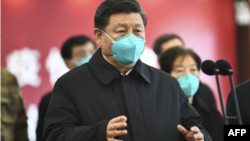Chinese President Xi Jinping has pledged $500 million in aid over the next three years to the countries of Central Asia to bolster their economies and security, while also extending its vaccine diplomacy by offering supplies to the region.
Speaking during an online summit of leaders from Kazakhstan, Kyrgyzstan, Tajikistan, Turkmenistan, and Uzbekistan to mark the 30th anniversary of establishment of diplomatic ties between Beijing and the five former Soviet republics, Xi said on January 25 that the funds will be used "on projects involving people’s livelihoods.”
The Chinese leader also pledged to provide 50 million COVID-19 vaccine doses to the group of five nations this year and said Beijing may transfer vaccine production technology.
Vaccination rates in Central Asia have remained low due to a lack of available supplies, coupled with vaccine hesitancy among the population. The World Bank has called on governments in the region to increase information to the public and to encourage people, especially those with preexisting health conditions, to raise vaccination levels.
China has been seeking closer ties with the region but has been cautious given that Moscow sees the former Soviet republics as part of its so-called sphere of influence.
It has also been accused of seeking to deepen ties around the world and further its geopolitical clout through so-called "vaccine diplomacy."
The Chinese government, which has been exporting millions of doses of COVID-19 vaccines mainly to developing countries, has repeatedly denied that it uses them to gain diplomatic advantage.
Some countries have rejected the main Chinese vaccines produced by Sinovac and Sinopharm, saying there is not enough information on their effectiveness.








